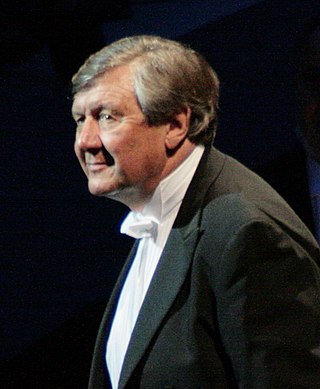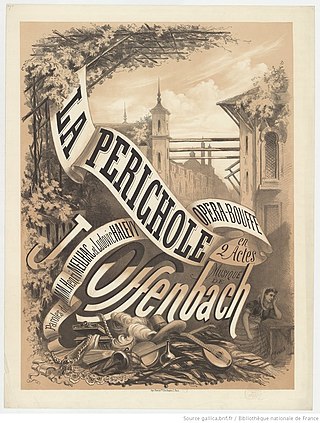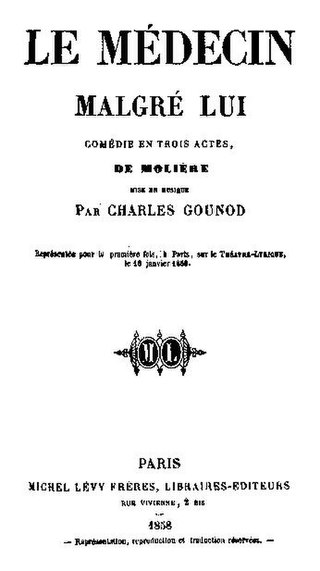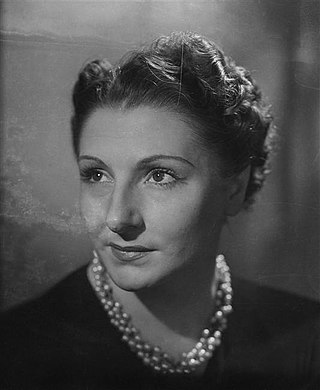Related Research Articles

Alexandre Charles Lecocq was a French composer, known for his opérettes and opéras comiques. He became the most prominent successor to Jacques Offenbach in this sphere, and enjoyed considerable success in the 1870s and early 1880s, before the changing musical fashions of the late 19th century made his style of composition less popular. His few serious works include the opera Plutus (1886), which was not a success, and the ballet Le cygne (1899). His only piece to survive in the regular modern operatic repertory is his 1872 opéra comique La fille de Madame Angot. Others of his more than forty stage works receive occasional revivals.
Paul Bonneau was a French conductor, composer and arranger, whose career was mainly in the field of light music and films.

Michel Plasson is a French conductor.

Le Médecin malgré lui is a farce by Molière first presented in 1666 at le théâtre du Palais-Royal by la Troupe du Roi. The play is one of several plays by Molière to center on Sganarelle, a character that Molière himself portrayed, and is a comedic satire of 17th century French medicine. The music composed by Marc-Antoine Charpentier is lost.

La Périchole is an opéra bouffe in three acts with music by Jacques Offenbach and words by Henri Meilhac and Ludovic Halévy. The opera depicts the mutual love of two impoverished Peruvian street singers – too poor to afford a marriage licence – and a lecherous viceroy, Don Andrès de Ribeira, who wishes to make La Périchole his mistress. Love eventually triumphs. The story is based loosely on the play Le carrosse du Saint-Sacrement by Prosper Mérimée (1828), and the title character is based on the Peruvian entertainer Micaela Villegas.
Laurent Pelly is a French opera and theatre director. He is sought after by the world's most prestigious houses. With a natural affinity for Italian and French repertoire, his creative curiosity has also led him towards other composers, including Russian and Czech. He brings theatrical insight to his work with singers and his concepts often contain surreal invention and a dark sense of humour. A master of detail, he underlines his interpretation of characters through skilful and inspired costume designs.
Denise Duval was a French soprano, best known for her performances in the works of Francis Poulenc on stage and in recital. During an international career, Duval created the roles of Thérèse in Les mamelles de Tirésias, Elle in La voix humaine, and excelled in the role of Blanche de la Force in Dialogues of the Carmelites, leaving recordings of these and several other of her main roles.

Paul Jules Barbier was a French poet, writer and opera librettist who often wrote in collaboration with Michel Carré. He was a noted Parisian bon vivant and man of letters.

Le médecin malgré lui is an opéra comique in three acts by Charles Gounod to a libretto by Jules Barbier and Michel Carré after Molière's play of the same name. The work premiered at the Théâtre Lyrique in Paris on 15 January 1858.
Alain Vanzo was a French opera singer and composer, one of few French tenors of international standing in the postwar era. He, along with such singers as Henri Legay and the Canadian Léopold Simoneau, represented a traditional French lyric style during a period when larger Italian and German vocal styles had become popular.

Janine Micheau was a French operatic soprano, one of the leading sopranos of her era in France, particularly associated with lyric soprano and coloratura soprano repertory.
Jacqueline Brumaire was a French operatic soprano and later teacher.

Juliette-Joséphine Simon-Girard was a French soprano, principally in operetta. Her father, Philippe Lockroy, was an actor at the Comédie Française, and her mother was Caroline Girard, of the Opéra-Comique.

Michel Trempont was a Belgian operatic baritone whose repertoire extended from the 18th century to the creation of contemporary works. His brother was Pol Trempont (1923–2007), operatic tenor and one time director of the Théâtre de Mons.

Maître Péronilla is an opéra bouffe in three acts of 1878 with music by Jacques Offenbach. The French libretto was by the composer with Charles-Louis-Étienne Nuitter and Paul Ferrier.

Jean-Vital Jammes was a French opera singer. During a stage career spanning 40 years, he created many leading baritone roles, including Zurga in Bizet's Les pêcheurs de perles and Ourrias in Gounod's Mireille. Born in Le Passage d'Agen near the town of Agen, he was largely self-taught and made his stage debut in 1841 at the age of 16. After singing in several provincial theatres, he was engaged by the Théâtre Lyrique in Paris and later by the Opéra-Comique. Following his retirement from the stage, Ismaël lived in Marseille where he died at the age of 68.
André Balbon was a French bass opera singer, born in Paris, on 4 June 1902 and dead in Alicante (Spain), on 30 March 1984. He was principally active in France in character roles.
Jules Gressier, (24 June 1897, in Roubaix – 27 June 1960, in Aix-les-Bains was a French conductor, particularly associated with lyric repertoire and with operetta.
Nadine Renaux was a French soprano, active in opera and operetta in France from the 1930s to the 1960s.

Marguerite Vaillant-Couturier was a French soprano who made her debut in Brussels at La Monnaie in 1880 in the title role of Gounod's Mireille. After appearing in Marseille the following year, she sang in operettas in Paris in the early 1880s. On 19 October 1882, she created the role of Micaëla in Lecocq's Le cœur et la main at the Théâtre des Nouveautés in Paris. In 1888, she gained success in the title role of Bizet's Carmen at the Opéra-Comique. She also appeared in Buenos Aires and Saint Petersburg.
References
- 1 2 Central Opera Service bulletin, Volume 23, No. 1 Archived 2015-09-23 at the Wayback Machine . (1981). Obituary: Freda Betti. p. 39
- ↑ Years of birth and death in the German National Library accessed 27 December 2014.
- 1 2 3 4 Obituary for Freda Betti in Opera , Vol 31, p299, 1980. accessed 27 December 2014.
- ↑ Listing of 1955 radio recording of The Snow Maiden conducted by Charles Bruck at the Operadiscography site accessed 27 December 2014.
- ↑ Listing of 1957 studio recording of Démophon by Johann-Christoph Vogel conducted by Georges Tzipine accessed 27 December 2014
- ↑ Listing of 1960 studio recording of Tosca conducted by Manuel Rosenthal at the Operadiscography site accessed 27 December 2014.
- ↑ L'encyclopédie multimedia de la comédie musicale théâtrale en France (1918-1944), Delannoy's Philippine accessed 27 December 2014.
- ↑ Freda Betti page at the Association de l'Art Lyrique Français website accessed 13 July 2015.
- ↑ L'Avant-Scène Opéra, La Périchole - No 66, August 1984, p114.
- ↑ List of performances, operaclass.com